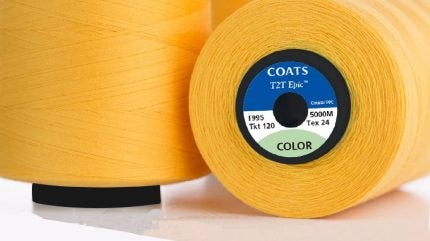
These threads, made from post-industrial and post-consumer waste, are available in two variants T2T Epic and T2T Gramax.
Coats developed the T2T threads at its Sustainability Hub in India through a chemical recycling process.

Discover B2B Marketing That Performs
Combine business intelligence and editorial excellence to reach engaged professionals across 36 leading media platforms.
The innovation promises to maintain the same level of strength, durability, and colour retention as the company’s established thread offerings. It can be integrated into existing sewing machine lines without any interruption to production.
The introduction of these threads is poised to have a substantial impact on the industry by potentially redirecting millions of garments from landfill annually. This process not only lessens the ecological footprint but also promotes the progression of a circular economy.
Coats apparel commercial senior vice president Adriana Morasco said: “At Coats, circularity is no longer a concept; it’s a commitment. Our Textile-to-Textile threads show that sustainability and performance can go hand in hand. They are designed to fit seamlessly into existing production lines, helping brands move faster toward their circularity goals.”
Looking ahead, Coats looks to ramp up its use of preferred raw materials from 31% in 2022 to 60% by 2026.

US Tariffs are shifting - will you react or anticipate?
Don’t let policy changes catch you off guard. Stay proactive with real-time data and expert analysis.
By GlobalDataThis initiative is instrumental for brand partners seeking to enhance their material usage and incorporate circular content into the sewing thread.
Coats will launch this advancement during the Textile Exchange Conference in Lisbon, Portugal from 13-17, October 2025.
The conference serves as an important platform for stakeholders across the textile supply chain including brands, innovators, farmers, non-profit organisations, and academics to converge and discuss future directions for the industry.





